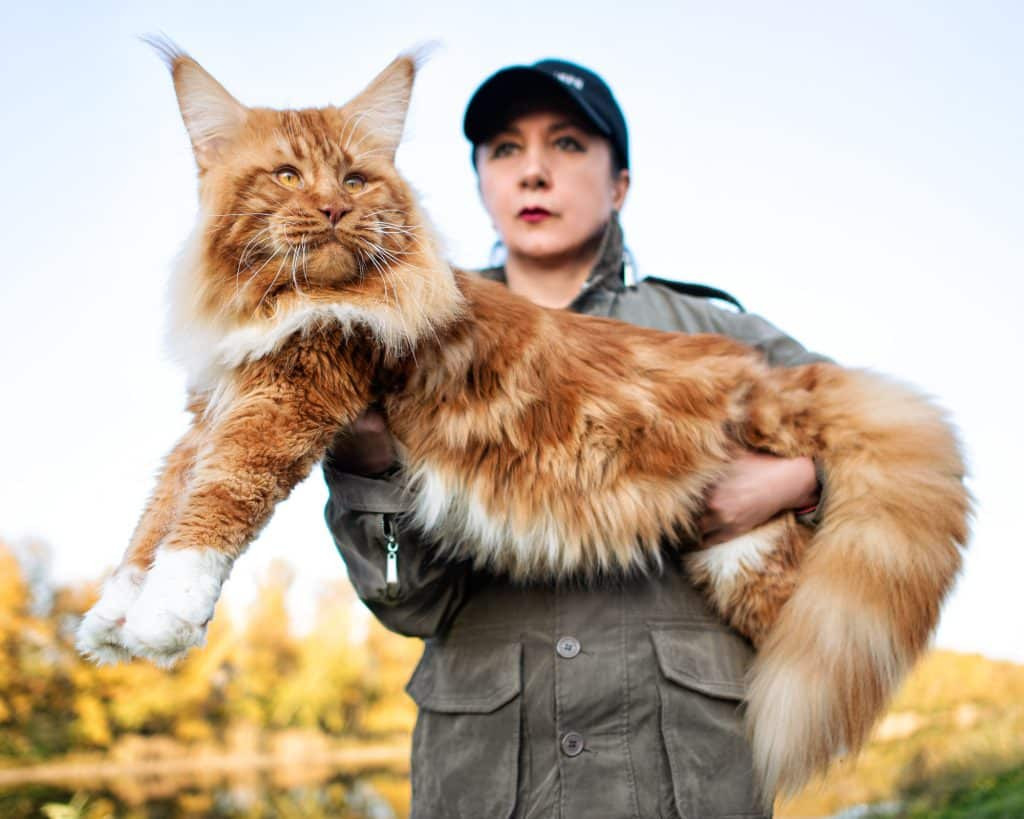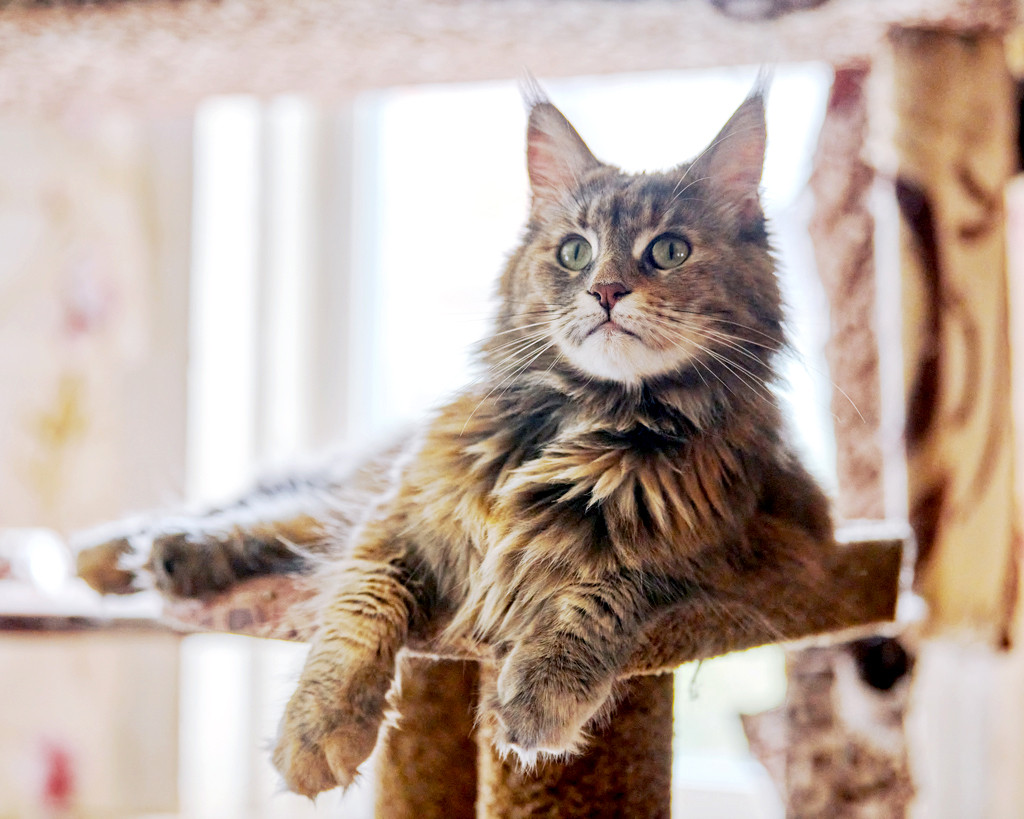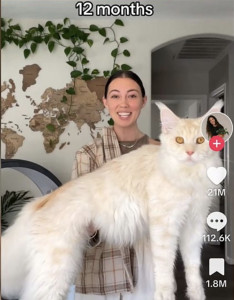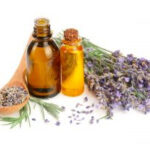What Is The Maine Coon Cat? It’s a gentle giant and a beloved breed, known for its impressive size and friendly nature. At solcat.net, we’re diving into the fascinating world of Maine Coons, exploring their unique characteristics, care requirements, and the joy they bring to countless homes. If you’re curious about adopting one of these magnificent felines or simply want to learn more about these furry family members, get ready to uncover the details that define these remarkable cats, along with tips on maine coon breeders, Maine Coon Kittens and finding the best Maine Coon rescue options.
1. What is a Maine Coon Cat and What Makes It Special?
The Maine Coon cat is a large, domestic long-haired cat breed, known for its intelligence and playful nature. What makes it special is its dog-like personality, friendly demeanor, and impressive size, making it a popular choice for families and individuals alike.
Maine Coon cats are often referred to as “gentle giants” due to their affectionate and sociable nature. Unlike some cat breeds that prefer solitude, Maine Coons thrive on human interaction and are known to form strong bonds with their families. According to the American Animal Hospital Association (AAHA), Maine Coons are among the most sociable cat breeds, often following their owners from room to room and actively seeking attention. Their playful nature also sets them apart, as they enjoy interactive games and can even be trained to perform tricks. Their striking appearance, with a long, flowing coat and bushy tail, adds to their appeal, making them truly unique and special companions.
2. How Big Do Maine Coon Cats Get? Understanding Their Size
Maine Coon cats are one of the largest domestic cat breeds; males typically weigh between 18 to 22+ pounds (8.2 to 10+ kg), with females weighing 12 to 15 pounds (5.4 to 6.8 kg), and can reach lengths of up to 40 inches. This impressive size contributes to their gentle and majestic presence.
 Woman holding a ginger Maine Coon Cat
Woman holding a ginger Maine Coon Cat
Their large size is one of the most distinctive features of the Maine Coon. According to the Guinness World Records, the longest domestic cat ever was a Maine Coon named Stewie, measuring 48.5 inches in length. While Stewie’s size was exceptional, it highlights the breed’s potential for significant growth. Male Maine Coons generally outweigh females, and their muscular build adds to their overall size. The combination of their length, weight, and robust physique makes them stand out among other cat breeds.
3. What is the Personality of a Maine Coon Cat?
Maine Coon cats are known for their friendly, gentle, and playful personality, often described as “dog-like” due to their loyalty and sociable nature. They enjoy human company and are typically good with children and other pets.
According to feline behavior experts, Maine Coons exhibit several traits that contribute to their endearing personality. They are highly intelligent and can be trained to perform tricks or walk on a leash. Their playful nature means they enjoy interactive games and puzzles, keeping them mentally stimulated. Maine Coons are also known for their gentle demeanor, making them excellent companions for families with children. Their sociable nature extends to other pets, and they often get along well with dogs and other cats. While they enjoy attention, they are not overly demanding, preferring to be near their owners rather than constantly seeking affection. This combination of traits makes them a well-rounded and delightful addition to any household.
4. What Are the Grooming Needs for a Maine Coon Cat?
Maine Coon cats require regular grooming due to their long, thick fur. Brushing 2-3 times a week is essential to prevent mats and reduce shedding, while occasional baths can help maintain coat health.
Maintaining the luxurious coat of a Maine Coon requires a consistent grooming routine. Their fur is prone to matting, especially in areas like behind the ears, under the belly, and around the legs. According to the Cornell Feline Health Center, regular brushing helps remove loose hair, distribute natural oils, and prevent painful mats from forming. Using a wide-toothed comb or slicker brush can effectively detangle their dense fur. During seasonal coat changes, more frequent brushing may be necessary to manage increased shedding. Regular nail trimming, ear cleaning, and dental care are also important components of their grooming routine.
5. What is the History and Origin of the Maine Coon Cat?
The Maine Coon cat originated in the American Northeast, specifically the state of Maine, and is one of the oldest natural breeds in North America. Its exact origins are uncertain, but popular theories suggest it evolved from crosses between domestic cats and long-haired breeds brought over by European sailors.
 Ginger Maine Coon Cat lying outdoors
Ginger Maine Coon Cat lying outdoors
The history of the Maine Coon is shrouded in folklore, with several myths surrounding its origins. One popular theory suggests that it is the result of matings between domestic cats and raccoons, which is biologically impossible but explains the breed’s bushy tail. A more plausible explanation is that the Maine Coon evolved through natural selection, adapting to the harsh winters of New England. Cats brought over by European settlers likely interbred, resulting in a large, hardy breed with a thick coat. The Maine Coon gained popularity in the late 1800s, winning cat shows in major cities like New York and Boston. Despite a decline in popularity in the early 20th century, the breed was revived and is now one of the most popular in North America.
6. What Health Issues Are Maine Coon Cats Prone To?
Maine Coon cats are generally healthy but are prone to certain genetic health issues, including hypertrophic cardiomyopathy (HCM), hip dysplasia, and spinal muscular atrophy (SMA). Regular veterinary checkups and genetic testing can help manage these risks.
According to veterinary experts, HCM is a common concern in Maine Coons, causing thickening of the heart muscle and potentially leading to heart failure. Early detection through echocardiograms and genetic testing can help manage the condition. Hip dysplasia, another potential issue, affects the hip joint and can lead to arthritis and pain. Spinal muscular atrophy (SMA) is a genetic disorder affecting muscle control, but it typically does not significantly impact a cat’s quality of life. Obesity can also be a concern if Maine Coons are not kept active and fed a balanced diet. Regular veterinary visits, a healthy lifestyle, and awareness of these potential health issues can help ensure the well-being of your Maine Coon.
7. How Much Does a Maine Coon Cat Cost?
The cost of a Maine Coon cat can vary widely, depending on factors such as the breeder’s reputation, the cat’s pedigree, and location. Generally, you can expect to pay between $1,000 to $2,000 or more for a Maine Coon kitten from a reputable breeder.
Adopting a Maine Coon from a rescue organization may be less expensive, with adoption fees typically ranging from $50 to $200. However, the initial cost is just one aspect of owning a Maine Coon. Ongoing expenses include food, grooming supplies, veterinary care, and toys. High-quality food can cost between $50 to $100 per month, while grooming supplies and routine vet visits can add several hundred dollars to your annual expenses. Being prepared for these costs ensures that you can provide the best possible care for your Maine Coon.
8. What Kind of Food Should I Feed My Maine Coon Cat?
Maine Coon cats should be fed a high-quality diet rich in animal-based proteins, such as chicken, turkey, or fish, to support their energy levels and muscle development. Portion control is important to prevent obesity.
Proper nutrition is vital for maintaining the health and well-being of your Maine Coon. According to veterinary nutritionists, a diet high in animal-based proteins is essential for supporting their muscle mass and energy needs. Look for cat foods that list meat, poultry, or fish as the primary ingredients. Omega-3 and omega-6 fatty acids, found in fish oils, can also help maintain their shiny coat and healthy skin. Wet food can be beneficial for hydration, while dry food can contribute to dental health. Always provide fresh water and monitor their weight to prevent obesity. Consulting with your veterinarian can help you determine the best diet and feeding schedule for your Maine Coon.
9. Can Maine Coon Cats Be Trained?
Yes, Maine Coon cats are highly intelligent and trainable. They can learn tricks, follow commands, and even be trained to walk on a leash, making them a joy to work with.
Training a Maine Coon can be a rewarding experience due to their intelligence and eagerness to please. According to cat behaviorists, positive reinforcement techniques work best with Maine Coons. Using treats, praise, and affection as rewards can motivate them to learn new behaviors. Start training early, focusing on one behavior at a time to avoid confusion. Maine Coons can be trained to use a litter box, walk on a leash, and perform tricks like sitting, staying, and fetching. Interactive play with toys can also help keep them engaged and mentally stimulated. Consistency and patience are key to successful training, and with the right approach, you can build a strong bond with your trainable Maine Coon.
10. Are Maine Coon Cats Good With Children and Other Pets?
Maine Coon cats are generally excellent with children and other pets due to their gentle and sociable nature. They are known to form strong bonds with their families and are typically patient and tolerant, making them ideal companions.
 Maine Coon Cat
Maine Coon Cat
Maine Coons are well-suited for households with children and other pets. Their playful and affectionate nature makes them great playmates for children, and they are known to be gentle and patient, even when faced with the sometimes unpredictable behavior of young kids. According to pet behavior experts, early socialization is crucial for ensuring that Maine Coons get along well with other pets. Introducing them to new animals slowly and providing positive experiences can help them form strong bonds. While every cat is different, Maine Coons are generally adaptable and enjoy the company of other animals, making them a harmonious addition to multi-pet households.
11. What Are the Different Colors and Patterns of Maine Coon Cats?
Maine Coon cats come in a wide variety of colors and patterns, including tabby, solid, tortoiseshell, and calico. The most common colors include brown tabby, black, white, and cream.
The diversity of colors and patterns in Maine Coons adds to their appeal. According to breed standards, Maine Coons can exhibit almost any color and pattern combination, with the exception of pointed patterns (like those seen in Siamese cats), chocolate, and lavender. Tabby patterns, characterized by stripes, swirls, or spots, are particularly common. Solid colors, such as black, white, and cream, are also popular. Tortoiseshell patterns, which feature a mix of black and orange, are exclusive to female cats. Calico patterns combine white with patches of black and orange. The wide range of colors and patterns ensures that there is a Maine Coon to suit every preference.
12. How Long Do Maine Coon Cats Live?
Maine Coon cats typically have a lifespan of 10 to 13 years, but with proper care and a healthy lifestyle, they can live even longer.
The lifespan of a Maine Coon is influenced by factors such as genetics, diet, lifestyle, and veterinary care. According to veterinary studies, Maine Coons that receive regular checkups, vaccinations, and preventative care tend to live longer. A balanced diet, regular exercise, and a stress-free environment can also contribute to their longevity. While genetic health issues can impact their lifespan, early detection and management can help improve their quality of life. Providing a loving and supportive home environment can also play a significant role in helping your Maine Coon live a long and happy life.
13. What is the Best Way to Find a Reputable Maine Coon Breeder?
Finding a reputable Maine Coon breeder involves thorough research and careful consideration. Look for breeders who prioritize the health and well-being of their cats, conduct genetic testing, and provide a clean and nurturing environment.
When searching for a Maine Coon breeder, it’s essential to do your homework. According to the Cat Fanciers’ Association (CFA), a reputable breeder should be knowledgeable about the breed, willing to answer your questions, and transparent about their breeding practices. They should conduct genetic testing to screen for health issues like HCM, hip dysplasia, and SMA. Visit the breeder’s facility to ensure that the cats are housed in a clean and spacious environment and that they are well-socialized. Ask for references from previous customers and check online reviews to assess the breeder’s reputation. A responsible breeder will prioritize the health and temperament of their cats over profit and will be committed to finding the right homes for their kittens.
14. Are Maine Coon Cats Vocal?
Maine Coon cats are not excessively vocal but communicate through soft chirps, trills, and meows. They are known for their gentle and expressive vocalizations, rather than loud or constant meowing.
Unlike some cat breeds that are known for their constant meowing, Maine Coons tend to be more reserved in their vocalizations. According to cat behavior experts, Maine Coons use a variety of soft sounds to communicate with their owners, including chirps, trills, and gentle meows. These vocalizations are often used to express affection, initiate play, or simply get your attention. While they may not be as talkative as some breeds, Maine Coons are still highly communicative and use their voices to convey their needs and emotions.
15. What Are Some Fun Facts About Maine Coon Cats?
Maine Coon cats are full of surprises, with many unique and interesting facts that add to their charm. Here are a few fun facts about Maine Coons:
- The Maine Coon is the official state cat of Maine, a testament to its American origins.
- A Maine Coon cat won the first cat show in North America, held at Madison Square Garden in 1895.
- Despite a popular myth, the Maine Coon is not a cross between a cat and a raccoon; its bushy tail simply earned it that moniker.
 Maine Coon Cat at 12 months old
Maine Coon Cat at 12 months old
These facts highlight the rich history and unique characteristics of the Maine Coon breed. Their all-American heritage, early success in cat shows, and distinctive physical traits make them a beloved and fascinating breed.
16. What Are Some Common Myths About Maine Coon Cats?
Despite their popularity, several myths surround Maine Coon cats. One of the most common is that they are a cross between a cat and a raccoon, which is biologically impossible. Another myth is that all Maine Coons are aggressive or difficult to handle, which is untrue, as they are generally known for their gentle and friendly nature.
Dispelling these myths is important for understanding the true nature of Maine Coons. According to feline geneticists, it is impossible for cats and raccoons to interbreed due to their different chromosome counts and genetic makeup. The Maine Coon’s bushy tail, which resembles that of a raccoon, likely contributed to this myth. As for their temperament, Maine Coons are typically gentle, sociable, and good with children and other pets. While individual personalities may vary, the breed is known for its affectionate and easygoing nature.
17. How Do Maine Coon Cats Adapt to Different Living Environments?
Maine Coon cats are adaptable and can thrive in various living environments, from apartments to large homes. However, they require enough space to move around and play, as well as mental stimulation to prevent boredom.
Whether you live in a small apartment or a sprawling house, Maine Coons can adapt to their surroundings. According to pet behaviorists, providing them with vertical spaces, such as cat trees or shelves, can help them feel more secure and satisfied. Interactive toys, puzzle feeders, and regular play sessions can also keep them mentally stimulated and prevent boredom. While they enjoy having space to roam, Maine Coons are also content to cuddle up with their owners and relax indoors. With the right environment and plenty of attention, they can thrive in any living situation.
18. What Kind of Toys Do Maine Coon Cats Enjoy?
Maine Coon cats enjoy a variety of toys that cater to their playful and intelligent nature. Some popular options include interactive toys, puzzle feeders, and toys that mimic prey, such as toy mice or feathers.
Choosing the right toys for your Maine Coon can help keep them entertained and mentally stimulated. According to cat behavior experts, interactive toys that require them to problem-solve, such as puzzle feeders, can be particularly engaging. Toys that mimic prey, such as toy mice or feathers attached to a wand, can also satisfy their hunting instincts. Catnip-filled toys can provide a burst of energy and excitement. Providing a variety of toys and rotating them regularly can help keep your Maine Coon interested and prevent boredom.
19. How Often Should I Take My Maine Coon Cat to the Vet?
Maine Coon cats should have regular veterinary checkups at least once a year for adults and more frequently for kittens and senior cats. These checkups help monitor their overall health and detect any potential issues early on.
Regular veterinary care is essential for maintaining the health and well-being of your Maine Coon. According to the American Animal Hospital Association (AAHA), kittens require more frequent checkups to ensure they are growing and developing properly and to receive vaccinations and parasite prevention. Adult cats should have annual checkups to monitor their overall health and screen for any potential issues. Senior cats, typically those over the age of seven, may benefit from more frequent checkups to address age-related health concerns. Regular veterinary visits can help ensure that your Maine Coon stays healthy and happy throughout its life.
20. How Can I Ensure My Maine Coon Cat is Happy and Healthy?
Ensuring your Maine Coon cat is happy and healthy involves providing a loving and stimulating environment, a balanced diet, regular grooming, veterinary care, and plenty of attention.
Providing a loving and supportive home environment is crucial for the well-being of your Maine Coon. According to pet behavior experts, spending quality time with your cat, providing plenty of playtime, and offering a safe and comfortable living space can help them thrive. A balanced diet, regular grooming, and routine veterinary care are also essential for maintaining their physical health. By addressing their physical and emotional needs, you can help ensure that your Maine Coon lives a happy and fulfilling life.
Call to Action
Ready to dive deeper into the world of Maine Coons? Visit solcat.net for more informative articles, adorable pictures, and helpful resources. Whether you’re a seasoned cat owner or just starting your feline journey, we’ve got everything you need to provide the best care for your beloved Maine Coon!

